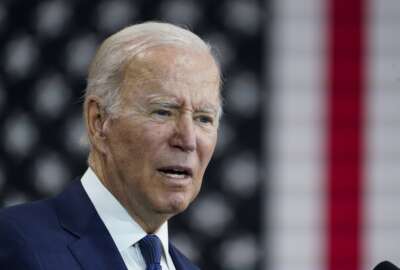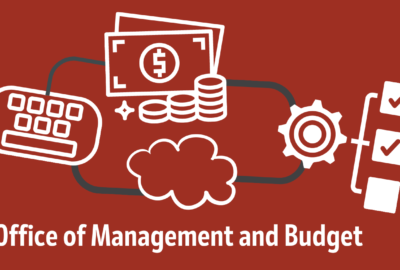Hubbard Radio Washington DC, LLC. All rights reserved. This website is not intended for users located within the European Economic Area.
Joint review meetings are OMB’s latest tool to improve program performance
Deidre Harrison, the deputy controller, who is delegated the duties of the controller in OMB, said several cross-agency initiatives like the fraud symposium and...
The federal improper payment rate ticked up in fiscal 2023. The Office of Management and Budget says the slight increase to 5.43% from 5.12% was mainly due to documentation problems.
Deidre Harrison, the deputy controller, who is delegated the duties of the controller in OMB, said the Office of Federal Financial Management is not only continuing to reduce the improper payment rate in 2024 and beyond, but driving better program integrity across all agency financial efforts.
“Our new approach is all about bringing in our oversight partners at the front end. We need to make sure that this year, in particular, we are institutionalizing all of those processes that we’ve been putting in place the last couple of years,” Harrison said in an exclusive interview with Federal News Network. “One of the most exciting new things we are doing are these meetings that we call joint review meetings, where we are bringing together agency program teams, their leadership, their inspector generals along with White House and OMB partners to really think about oversight and performance on the front end together. We are also making sure that agencies have the tools they need to get their jobs done, that they are sharing best practices, they’re identifying tools that work and they are sharing those tools with each other. We don’t want agencies having to solve these problems on their own. In order to do that, we have stood up a new payment integrity and fraud symposium, where we bring together program staff and leadership to collaborate and learn in real time.”
Over the last two years, OMB held about 60 joint review meetings, starting as a pilot with the American Rescue Plan Act and then expanding and institutionalizing them for other laws like the Bipartisan Infrastructure Law, the Inflation Reduction Act and several others.
Harrison said OMB creates a template of questions for agencies to answer ranging from how they are thinking about internal controls to measuring and mitigating risks to the kinds of oversight reports they are going to ask recipients to provide.
“We are also asking big questions like, what are the legislative requirements for this program? How are they different from before? They are meant to be prompts to create a conversation. We work with the program team to work through those questions, and if there are areas that would benefit from hearing from the IG, from the White House, from the agency leadership, we highlight those in the meeting,” she said. “They really are a discussion. It’s not about preclearance. It’s not about not having an audit on the program. It’s about learning from the expertise that exists inside your agency and across the government. And I will tell you, it works. It happens live, and I have seen agencies think about the decisions they are making and how they’re going to implement their program in a different way.”
OMB connecting financial dots
The lessons learned and best practices that come from the meetings aren’t just limited to that one agency or program. Harrison said OMB and the CFO Council are making sure the information is flowing in both directions.
For example, she said the fraud symposium brings agencies together along with IGs and experts from the Government Accountability Office to share the best practices and further institutionalize them.
“Another warm body of work that is underway right now is with the Joint Financial Management Initiative with GAO, Treasury, OMB, and the Office of Personnel Management. We, as a group, have committed to prioritizing the prevention of fraud, waste and abuse,” she said. “We are working on a multi-year plan where we will leverage all of our best practices across our organizations to help agencies tackle that really important issue.”
OMB and its partners kicked off the JFMI in 2020 and issued a report and new tool in 2022.
The joint review meetings came about shortly after the passage of the American Rescue Plan Act. Harrison said it was clear OMB was hearing different sets of facts and messages from agencies about implementation efforts. She said it was clear more coordination would be helpful.
“We realized the only way to get to the bottom of the problem was to have everyone in one virtual room at the same time. So that was the creation of these meetings. They started with one program,” she said. “At the end of the hour, these meetings, because of all of the high level officials that participate, tend to be at the end of the day, often, at the time when people don’t have places to go afterwards except home. So many of them go along and we continue the discussion. I will tell you, the best meetings are just that people are coming off mute and asking questions. I’ve had agencies pull up spreadsheets live showing their IG in the meeting, like ‘well, this is the data we’re looking at,’ and sharing information with each other. That is when they are at their best when they really are in discussion.”
Harrison, who has been either acting controller or performing the duties of the controller since August 2022, didn’t specifically call out the meeting or symposium’s impact on improper payments. OMB has been without a permanent controller since Dave Mader left in January 2017.
But with payment integrity and fraud prevention a major Biden administration initiative, the impact of these programs is clear in the most recent data.
CMS sees major reduction
OMB says in its release about the improper payment rate that “excluding three time-bounded pandemic relief programs that were designed, implemented, and overwhelmingly administered at the onset of the pandemic in 2020 (Pandemic Unemployment Assistance program, Paycheck Protection Program, and COVID-19 Economic Injury Disaster Loan program), the fiscal 2023 rate was 4.03%—the lowest level since 2014.”
Additionally, OMB found the Centers for Medicare and Medicaid Services (CMS), with Medicaid and Children’s Health Insurance Program (CHIP) continued to significantly reduce their respective improper and insufficient documentation payment rates. These programs reduced those rates by 7.04% and 13.94% respectively last year.
Along with payment integrity and reducing fraud, Harrison said another big priority is around grants management. This includes rewriting and updating the uniform grants guidance, which it released in draft form in September, improving the reporting of grants down to the project level and launching a new Council on Federal Financial Assistance in August.
“Since the passage of the Bipartisan Infrastructure Law, we have been working hard with our agency partners on thinking about how to improve project level reporting. Today, you can go to USAspending.gov and you can see a lot of the reporting that is required to provide oversight, but all that reporting is at the award level. So you might imagine a state gets an award for a block grant and then that award gets divvied up to a bunch of projects. Today, you’re not required to report at the project level,” Harrison said. “We have been working with our agency partners on the programs and the Bipartisan Infrastructure Law to up that reporting to the project level. That has been a big body of work. We have done a pilot and we are through our initial pilot stages. We are rolling that out for all of the programs that have construction projects in the BIL. This year, are on track to share that information publicly.”
New GREAT Act guidance coming
The lessons from those pilots may also be incorporated into upcoming new guidance to further implement the Grant Reporting Efficiency and Agreements Transparency (GREAT) Act of 2019.
“The GREAT Act really requires agencies to work together to ask recipients the same questions in the same way. So that way, maybe there’s a future where a recipient doesn’t have to report the same information, 10 times to 10 different programs and slightly different, albeit very annoyingly. So in order to get that, right, we need to have the right set of information that every agency is asking. It’s not going to always be perfect, there’s not going to be 100% alignment, but there should be a core. These are the 10 elements that every program, if it’s this type of program should be collecting,” Harrison said. “But more important than that, this is the way that agencies should be asking the question or data standards. When you ask for an address, that address should be no more than 100 characters or the zip code needs to be zip code plus four, we have made a lot of progress on that previously on the GREAT Act. But we didn’t finish that work. Our last guidance that went out identified the data elements that should be at the core, but we didn’t identify exactly how agencies should be answering those questions and all the same way. That’s the next round of data at GREAT Act. It’s making sure that we are saying, as a government, when we asked you for your address, we are going to ask for it the same way every way, every time and making sure that all of our forms are following that.”
Harrison added the new council will be critical in leading many of these grant making-focused efforts in the coming years.
OMB recently named Dale Bell, the deputy assistant secretary in the Office of Grants at the Department of Health and Human Services, as the first co-chairman of the council.
Copyright © 2024 Federal News Network. All rights reserved. This website is not intended for users located within the European Economic Area.
Jason Miller
Jason Miller is executive editor of Federal News Network and directs news coverage on the people, policy and programs of the federal government.
Follow @jmillerWFED
Related Stories
Biden pulls OMB controller nominee tasked to oversee infrastructure, pandemic spending
With 40% of funds spent on compliance, OMB aims to give grantees some relief
Related Stories
-
With 40% of funds spent on compliance, OMB aims to give grantees some relief Reporter's Notebook






